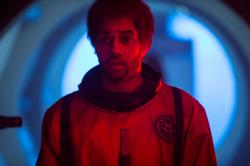Mummy On The Orient Express
Saturday, 11 October 2014 - Reviewed by
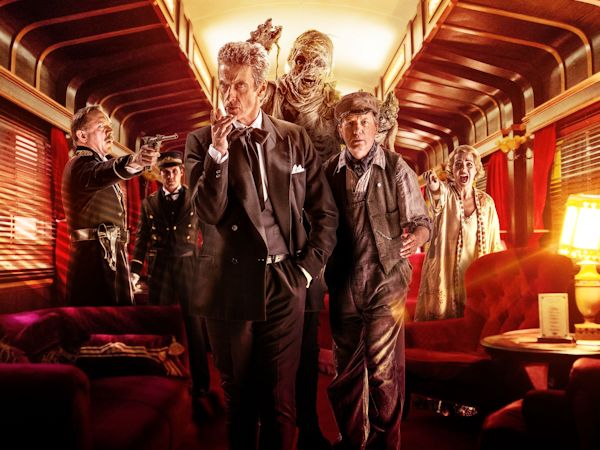
Mummy On The Orient Express
Written by Jamie Mathieson
Directed by Paul Wilmshurst
Starring Peter Capaldi, Jenna Coleman, Frank Skinner, David BamberChristopher Villiers, Daisy Beaumont, John Sessions, Foxes Samuel Anderson,
Premiere 11 October, BBC One
"You know Doctor, I can't tell if you are a genius or incredibly arrogant',.. "On a good day I'm both". - Perkins to the Doctor
What a romp and what a showcase for Capaldi. This was always the breed of story I hoped to get when Steven Moffat was first confirmed as showrunner. It has the heart of Doctor Who's golden period from 1974 to 1977 when Tom Baker was at his peak but also slots in very comfortably with a 2014 autumn schedule on a Saturday night. Doctor Who has often borrowed its own past successes and done something new, often to great effect. Thanks to a very capable director in Paul Wilmshurst (who continues to impress after 'Kill the Moon') and a more than competent script this is definitely one of those winners.
The story is remarkably simple without being too predictable. Various passengers from all walks of life on the Orient Express are being targeted by a remorseless creature that only they can see and feel. Despite their understandable panic there is only confusion from the people around them and nothing can be done within the span of Sixty-Six Seconds. And the Doctor realises that he is facing a stern test of his ability to come up with a solution. This is not a murder mystery for a Poirot or Marple and not everyone is playing by the rules..
The haunting killer of classic Who's 'Mind of Evil' is subtly referenced in the threat the Mummy presents - only the victims can see it . The way that it can move anywhere and not be stopped by physical items like bullets or locked doors is a perfect way to scare the junior members of the audience. The gimmick of having there be a visible counter remorselessly marking the moment of demise on-screen is somewhat odd but does come off - at least until Gallifrey's favourite son pulls off a beautiful trick (which doubles as an homage to Moffat's very first televised story).
The Orient Express is one of many in the cosmos and history, but this particular one rattles through the vacuum of space relentlessly, caring little for its appearance compared to other vessels that normally occupy this zone. It also used to be a tour through an area of the galaxy that had many a remarkable planet. However although this appears to be just another one of many journeys, there is a real twist when the whole vehicle is shown up as nothing more than a laboratory for testing a sample group. Although it is perhaps not totally watertight as the TARDIS has clearly broken into the environment!
What is clever is that quite a few of the victims are not all that likeable, or perhaps we catch them on a bad day. This is very welcome as it means that what normally is just monster fodder is something else and links in smoothly with the whole amoral presentation of this new Doctor which has fascinated many viewers since the season premiere. Also commendable is how the Doctor gets caught out several times - once when he casually mentions knowing a particularly memorable planet, now long-gone. This is put to effect later with an impact on the overall drama when the psychic paper turns out as not a simple plot short cut after all. The Doctor is realistically challenged, but such is his ego he will have none of it, and as bodies pile up his hubris and ruthlessness only seem to magnify.
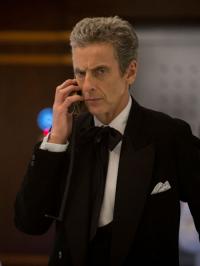 When it comes to actually saving the day, it turns out to be a pyrrhic victory. A good number of people get back home unscratched. Some of the apparently threatened passengers were only hard light holograms and so were never really at risk. But lives are lost and not just to the sinister bandaged antagonist. Other carriages with real living people are broken into and the bodies are left to float in space, most likely forever. And this is a direct consequence of the Doctor's efforts: he does get the right end result, but only after a fatal trial-and-error procedure. The Twelfth Doctor may not react too overtly to this disturbing turn of events but he surely knows he could have done something different.
When it comes to actually saving the day, it turns out to be a pyrrhic victory. A good number of people get back home unscratched. Some of the apparently threatened passengers were only hard light holograms and so were never really at risk. But lives are lost and not just to the sinister bandaged antagonist. Other carriages with real living people are broken into and the bodies are left to float in space, most likely forever. And this is a direct consequence of the Doctor's efforts: he does get the right end result, but only after a fatal trial-and-error procedure. The Twelfth Doctor may not react too overtly to this disturbing turn of events but he surely knows he could have done something different.Guest stars are all up to the standards the better episodes have set previously, with a welcome cameo from talented singer Foxes and a nicely balanced guest role for Frank Skinner as Perkins. When he first appears there is ever so slightly an element of creepiness as appears rather indifferent to an old woman's death; but then perhaps he didn't take kindly to being looked down upon as was implied by what little we saw of her. I won't claim Skinner is as good an actor as he is a comedian but he still fits the particular role quite handily. Having Capaldi around certainly helps too as he effectively assumes the role of guest companion. His eventual moment in the TARDIS is also wonderful. The sheer exuberance that someone experiences from seeing dimensional transcendence is a trope I will never tire of. Meanwhile Clara is forced into another section of the train and interacts quite significantly with Maisie - herself a fine one-off character that very much needs saving by the Doctor.
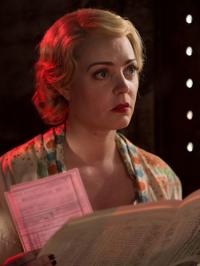 Yes, she did not storm off after all, despite all the signs being there. Clara perhaps more predictably is the voice of morality again; with her friend admitting he could not do anything until he had all the facts at hand. That they are still together is a result of their deeply held admiration and respect. Purely liking one another as most platonic friends doesn't come into it, but then how many friends are there who are come from different planets and have such contrasting life spans?
Yes, she did not storm off after all, despite all the signs being there. Clara perhaps more predictably is the voice of morality again; with her friend admitting he could not do anything until he had all the facts at hand. That they are still together is a result of their deeply held admiration and respect. Purely liking one another as most platonic friends doesn't come into it, but then how many friends are there who are come from different planets and have such contrasting life spans? Danny once again takes a backseat role the second week running, but the arc is still being explored in interesting ways. His seeming acceptance of Clara's hectic lifestyle and how the Doctor really cares on some level despite all his harmlessness is interesting if perhaps a little forced. I do welcome character development for this year's new star of Doctor Who and I am being won over gradually. However in all honesty I still find Samuel Anderson somewhat underwhelming in relative terms, especially if I were to compare him to Arthur Darvill who was rather similar in function.
Although the resolution sees the doctor disable the Foretold and use part of its core to save everyone remaining on the train, there is still no sign of the real threat who caused the crisis in the first place. This is a good idea and knowing Moffat there is as much chance that the answers come next season as they do by the closing twelfth episode of this present run of episodes. So we are left with a rock solid story that can stand up on its own and reward many a viewer's time, but also is well-woven into Series 8. I eagerly await the next Jamie Mathieson effort; conveniently enough it is scheduled for next Saturday evening.
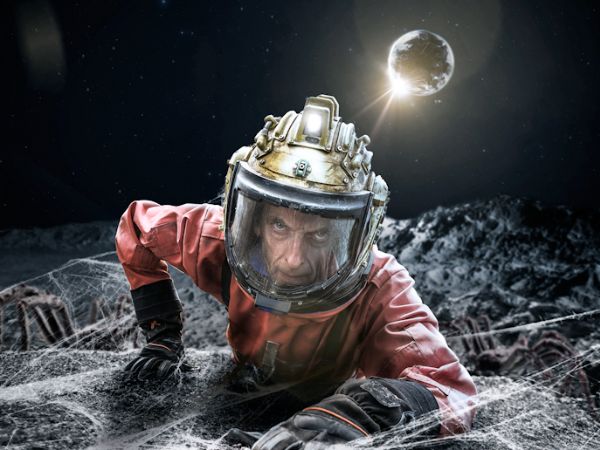
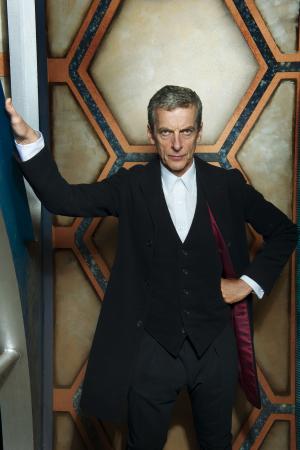 Before we get to
Before we get to 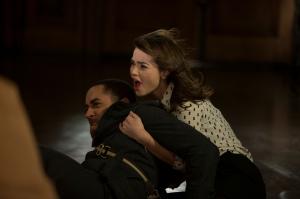 The Impossible Girl
The Impossible Girl 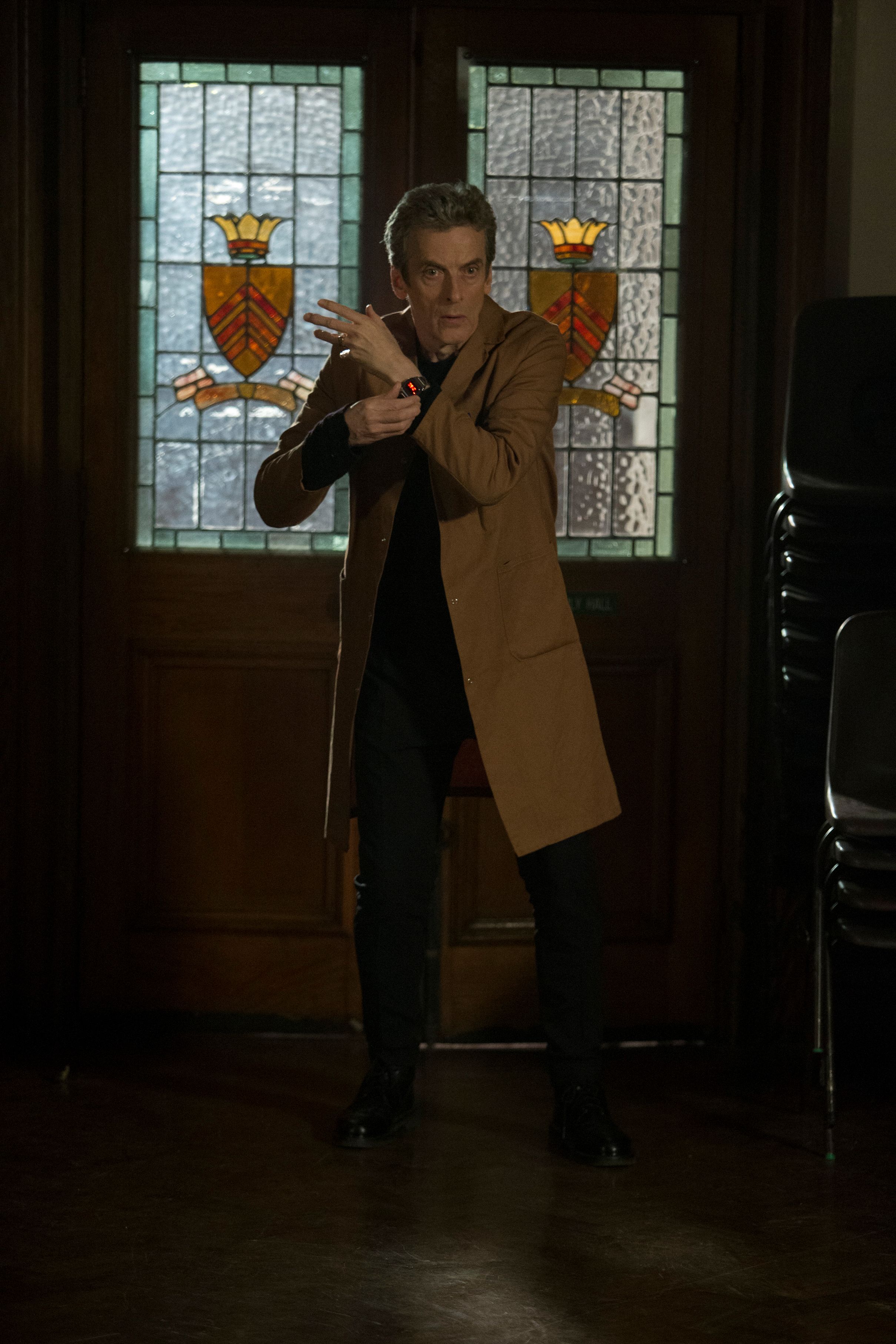
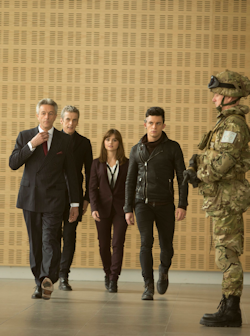
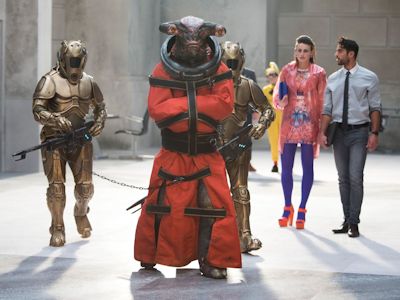 The Teller's main role as a brain eater is sufficiently scary and memorable. However there is no question that the most malicious and cruel antagonist is villainess Miss Delphox - played by Keeley Hawes (Ashes to Ashes). We are even led to have sympathy for the monster, as it is harnessed to cause damage to enemies of the Bank, by being kept in either chains or in a form of cocoon. Furthermore Delphox manipulates the Teller to dispose of a nuisance individual or two and describes the action as 'account deleted' and generally struts about the Bank giving out orders in a nonchalant way. Evidently the Doctor will have to use his keenest wits to come up with a solution against such an antagonist.. except the finale has a twist where our Time Lord icon gets help from the most unlikely of sources.
The Teller's main role as a brain eater is sufficiently scary and memorable. However there is no question that the most malicious and cruel antagonist is villainess Miss Delphox - played by Keeley Hawes (Ashes to Ashes). We are even led to have sympathy for the monster, as it is harnessed to cause damage to enemies of the Bank, by being kept in either chains or in a form of cocoon. Furthermore Delphox manipulates the Teller to dispose of a nuisance individual or two and describes the action as 'account deleted' and generally struts about the Bank giving out orders in a nonchalant way. Evidently the Doctor will have to use his keenest wits to come up with a solution against such an antagonist.. except the finale has a twist where our Time Lord icon gets help from the most unlikely of sources.